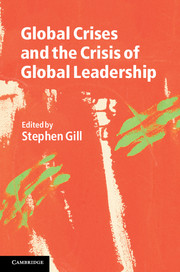Book contents
- Frontmatter
- Contents
- Contributors
- Acronyms
- Acknowledgements
- Introduction: global crises and the crisis of global leadership
- Part I Concepts of Global Leadership and Dominant Strategies
- Part II Changing Material Conditions of Existence and Global Leadership: Energy, Climate Change and Water
- Part III Global Leadership Ethics, Crises and Subaltern Forces
- 7 Global leadership, ethics and global health: the search for new paradigms
- 8 Global leadership and the Islamic world: crisis, contention and challenge
- 9 Public and insurgent reason: adjudicatory leadership in a hyper-globalizing world
- Part IV Prospects for Alternative Forms of Global Leadership
- Glossary
- Bibliography
- Index
7 - Global leadership, ethics and global health: the search for new paradigms
from Part III - Global Leadership Ethics, Crises and Subaltern Forces
Published online by Cambridge University Press: 05 June 2012
- Frontmatter
- Contents
- Contributors
- Acronyms
- Acknowledgements
- Introduction: global crises and the crisis of global leadership
- Part I Concepts of Global Leadership and Dominant Strategies
- Part II Changing Material Conditions of Existence and Global Leadership: Energy, Climate Change and Water
- Part III Global Leadership Ethics, Crises and Subaltern Forces
- 7 Global leadership, ethics and global health: the search for new paradigms
- 8 Global leadership and the Islamic world: crisis, contention and challenge
- 9 Public and insurgent reason: adjudicatory leadership in a hyper-globalizing world
- Part IV Prospects for Alternative Forms of Global Leadership
- Glossary
- Bibliography
- Index
Summary
Summary
Global health is arguably the most pressing moral challenge for human security and well-being in the twenty-first century. In seeking solutions to this, I begin by suggesting the need to acknowledge that the world is in a state of entropy. This is reflected in widening disparities in health across the planet (despite major advances in science and medicine and spectacular economic growth), the emergence and spread of many new infectious diseases, climate change and the recently evolving global economic crisis – all of which are already having devastating effects on population health. These trends will continue if we fail to take appropriate action, and they reveal the need for new paradigms of thinking and action that require a shift in the spectrum of our value system from one dominated by a highly individualistic, competitive, scientific, market approach to health and well-being to an orientation that, while retaining the best of these values, is more inclusive of solidarity, cooperation and socio-economic and ecological sustainability considerations. A thrust towards making such progress could be promoted by expanding the discourses on ethics and human rights, and by developing the global state of mind essential for progress in an increasingly interdependent world.
Introduction
It is becoming apparent to some scholars that global health is the most pressing moral challenge for human security and social well-being in the twenty-first century (Benatar 2005). If this is an accurate diagnosis (and I do not intend to provide the evidence or rationale for this here, as there is already a voluminous literature on this topic), then the next step towards seeking solutions is to achieve widespread acceptance of this diagnosis. Only then can we begin to consider and take appropriate action.
- Type
- Chapter
- Information
- Global Crises and the Crisis of Global Leadership , pp. 127 - 143Publisher: Cambridge University PressPrint publication year: 2011
- 11
- Cited by



